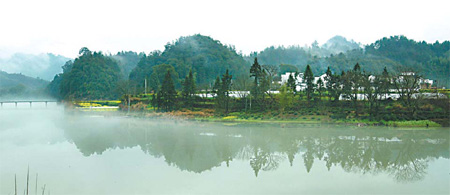

Water, water everywhere, and every drop is cherished. Wuyuan is crisscrossed with many beautiful rivers, which, in ancient times, served as major channels for transport. Logs, bamboo and tea were floated from the landlocked county to Poyang, China's largest fresh-water lake, and then on to all the commercial hubs along the Yangtze River.
The value of water is more discernable in its symbolic use, though. Many fengshui-conscious Chinese regard water as a symbol of wealth, and nowhere is it more palpable than in Wuyuan.
Every household here - I mean the old ones - has part of the roof open so that rain can pour into the main hall. While the architectural style of nearby provinces, such as northern Zhejiang, turns this open space into a courtyard, here in Wuyuan the rain-soaked ground is part of the hall and on clear days you won't notice much difference, except in some households the ground has sunken slightly.
But even if it's totally flat, the paved stone slabs actually hide a carefully dug tunnel underneath. For the water gathered here is not to be flushed out, but retained for as long as possible. Only when it overflows does it go outside.
Wealth is to be kept.
Wuyuan is now administratively part of Jiangxi province, though it originally belonged to Anhui province. In the days before railroads and expressways, Anhui was known for its successful merchants. Due to ancestral worship and hiding from wars and chaos, many officials retired to Wuyuan, bringing back a lifetime's fortune. They built mansions along the rivers and hoped their descendents would benefit eternally.
There are some 100 villages of such historical significance in Wuyuan, a dozen of which are open to the gaze of tourists. Don't worry about disturbing the residents. Those who open their doors are probably happy to see you because they are compensated by the tourism company, which charges 180 yuan ($26) for a five-day pass that covers a dozen destinations. If you visit fewer than three villages, a 60-yuan ticket makes more sense.